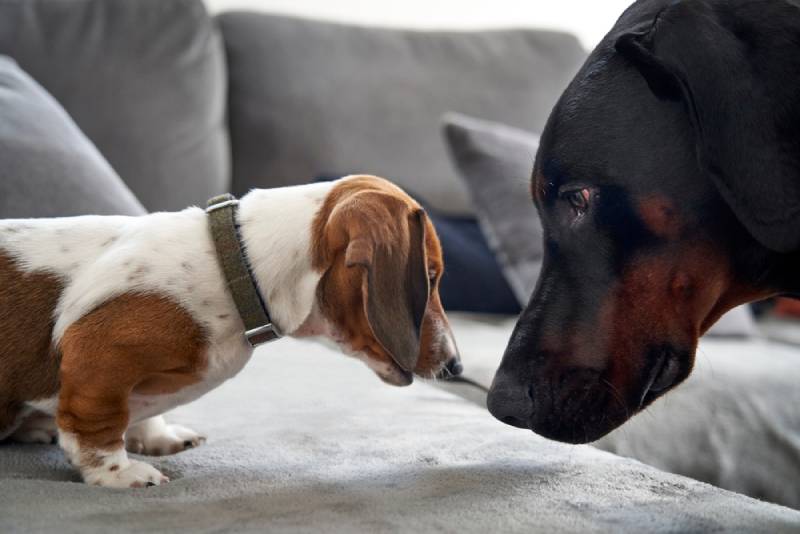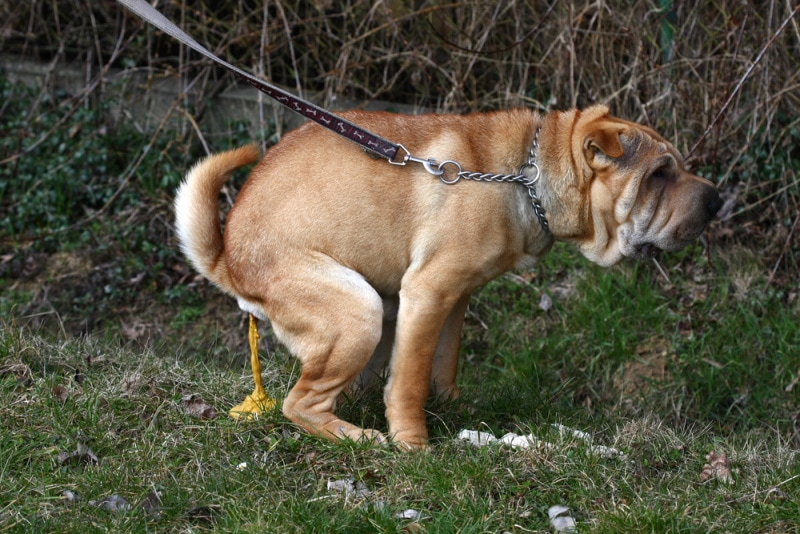Are Dobermans Good With Other Dogs? Vet-Approved Facts
Updated on

The Doberman Pinscher is an intelligent breed and makes excellent guard dogs. Part of the working group of dogs, they are fearless, alert, and protective. Many Dobie owners have no worries about burglars or trespassers on their property, and these powerful dogs are loyal and committed to their human family. But do they get along well with other dogs?
Dobermans get along well with other dogs of the opposite sex. For those thinking of adding a Doberman to their family, read on to learn more about these powerful and intelligent dogs and why they get along better with dogs of the opposite sex.
Why Do Dobermans Get Along Better With the Opposite Sex?
Dobermans tend to have same-sex aggression, meaning they may not get along with other dogs of the same sex. Inter-dog aggression is not uncommon, and it is something you need to be aware of, especially if you plan to pair a Dobie with the opposite sex.
This type of behavior is more prominent between 1 to 3 years of age, and roughly 79% of altercations are a result of same-sex aggression. Females account for 68% of instances of same-sex aggression, particularly in spayed females.

For intact males (non-castrated), the problem may arise more frequently because testosterone plays a part in fighting, and the dog will take more time to calm down. In neutered males, this type of aggression can be reduced by 60%. However, not all same-sex aggression stems from not being fixed; some behaviors are learned, which will require training and behavior modification to correct the problem.
Neutering your Doberman may not reduce aggression, but it could help. Please consult with your veterinarian as to when to schedule your Dobie’s spay or neuter. For large breed dogs, 12 to 18 months is usually an appropriate time.
- Related Read: Doberman Male vs Female: Key Differences (With Pictures)
What Dog Goes Well With a Doberman?
First of all, we’re not here to scare you away in regards to pairing a Doberman with another dog in your home. Not all Dobies display same-sex aggression, but you should be aware of this as a possibility. Early socialization is key in reducing the chance of same-sex aggression, but it may not eliminate it entirely, especially if your Dobie is mature.
That said, Dobies can get along with just about any dog, including small breeds. Some small breeds that have been known to live with Dobies are Pugs, Beagles, Jack Russell Terriers, Dachshunds, Cocker Spaniels, and Chihuahuas, to name a few.

For the best results, the smaller breed should be at least a few years older, as mature dogs know how to get out of the way when trouble arises; this scenario works wonderfully if you’re getting a Doberman puppy. Be mindful as your Dobie grows, as playtime may get rough due to the size difference, and your Dobie is still a puppy at heart.
Another note we want to mention is to keep the two dogs separated at feeding time, as this could spark some aggression from either dog.
Tips on Keeping Your Pets Safe
As we’ve mentioned, same-sex aggression can occur between a Doberman and another dog in your home. If you have a matured Dobie (especially one that’s still intact), it’s vital to train your Doberman to handle certain situations. For instance, teaching your Dobie to “leave it” is an excellent training tool that will help when you bring a new dog into the home, especially a small dog. Dobermans are natural predators and may mistake the small dog as prey, but if the dog knows the command, “leave it,” your Dobie will do just that.
Always separate the dogs during feeding times, especially with smaller dogs. A Doberman may snap as a warning if the other dog gets too close, and for a small dog, that snap could be deadly.
Keeping your Dobie on a leash during the initial interaction is a must. You, as the owner, need to be on your toes and ready to stop any altercation that may arise for the safety of both dogs.
You’ll also need to separate the dogs when you’re not home. Over time, you may be able to loosen up on this situation, but don’t do it until you’re 100% sure of the relationship between the two. You can place them in separate rooms, put one in a crate, leave the other out, etc.

Conclusion
It’s not impossible to pair a Doberman with another dog, but you need to ensure you understand your Dobie’s temperament and try to pair the opposite sex for the best results. You can hire a trainer to help with any aggression issues, and having your dogs fixed at the appropriate times in their lives can reduce same-sex aggression.
Dobermans love their humans and are usually one-person dogs, but they can get along with other dogs with proper training. Remember to always supervise your dogs, especially when a new dog is introduced, and keep them separated when you’re not home to ensure their safety.
See Also:
Featured Image Credit: gemphoto, Shutterstock










